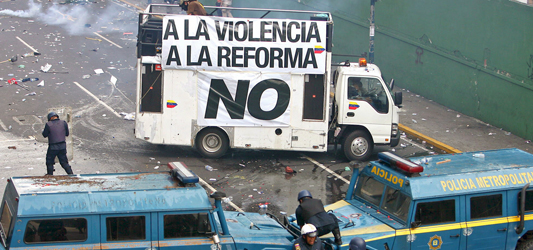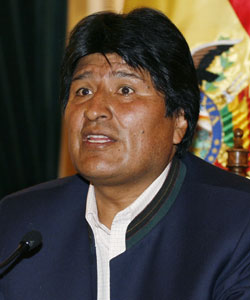Cracking constitutional change
Latin American leaders look for constitutional reform but face great opposition.

 |
| Efforts to reform constitutions in different Latin American countries have met resistance [EPA] |
Latin America moved towards socialism in 2005 and 2006. Towards the end of 2007 the next move seems to involve constitutional change.
In Bolivia, Evo Morales, the president, has pushed constitutional change which indigenous Aymara and Quecha Indians believe will give them back the rights they lost with the Spanish conquest five centuries ago.
Hugo Chavez, the Venezuelan president, recently lost a vote to reform his constitution. He says he will keep trying.
And Rafael Correa, the Ecuadorian president, has created a constitutional assembly to rewrite his country’s political blueprint.
Record number of attempts
It is the greatest number of Latin American countries to attempt such reform simultaneously since the continent’s independence from Spain more than 170 years ago.
However, the moves are not taking place smoothly.
 |
| Morales is promoting reforms as part of his socialist vision [File: AFP] |
Lucia Newman, Al Jazeera’s Latin American correspondent, said: “What these countries have in common is that they all have presidents who call themselves revolutionaries, and who are trying to make their constitutions more socialist while centralising power.”
In turn, they have been met with strong resistance, leading to divisions along racial, economic and geographical lines, to the extent that, in Bolivia, the future of the country is in doubt.
There Morales has promoted constitutional reform as an egalitarian step towards his vision for a socialist state.
If successful, the reforms will redistribute land and wealth to indigenous communities giving them more power. Basic services will be nationalised, the government will take over unproductive land holdings and impose tighter controls on the economy.
Yet, such centralisation has led to an opposition boycott of the new constitution with four states rejecting the charter and declaring themselves autonomous in mass public rallies in mid-December.
Santa Cruz, Tanija, Beni and Pando, states that contain significant amounts of the country’s natural resources, including large gas fields, rejected the new constitution of Morales’ MAS (Movement towards Socialism) party. Other states may follow.
‘Delicate line’
Fosendo Fraga, a political analyst, told Al Jazeera: “It’s a constitution that seeks to consolidate an authoritarian regime and establish a hyper-presidential system, the same thing that Chavez wants to do in Venezuela.”
Norman Madarasz, writing on counterpunch.com, said: “There is perhaps no situation in the world today treading the delicate line between revolution and reform more than Bolivia.”
But these are arguments Morales and his party refute.
 |
| Some Bolivian states have reacted by demanding increased autonomy [File: EPA] |
Morales said: “This is a political confrontation between the conservative free market forces who don’t want change, and the social movements that are betting on change but through democratic means. It is the only way.”
Alvaro Garcia Linera, the vice president, is similarly abrupt, stating in a Los Angeles Times interview: “We are a society where the colour of your skin, your ethnic origin, forms part of the class condition of society.”
Garcia said in the interview that members of what he describes as the light-skinned elite are unwilling to rescind even a small part of their privileges.
“They have to understand that the state is no longer a prolongation of their haciendas.”
The states that have rejected the new constitution and are threatening to secede if it is imposed control 75 per cent of the nation’s wealth.
In Ecuador, too, there are rumblings of secession in the oil-rich regions.
The presidents of Ecuador and Bolivia may enjoy majority support, which will be crucial when the constitutions are put to the popular vote for approval.
But a simple majority is not enough to provide the consensus needed for such a fundamental issue as a constitution. And without consensus, the only thing that is guaranteed is more division and instability in the new year.